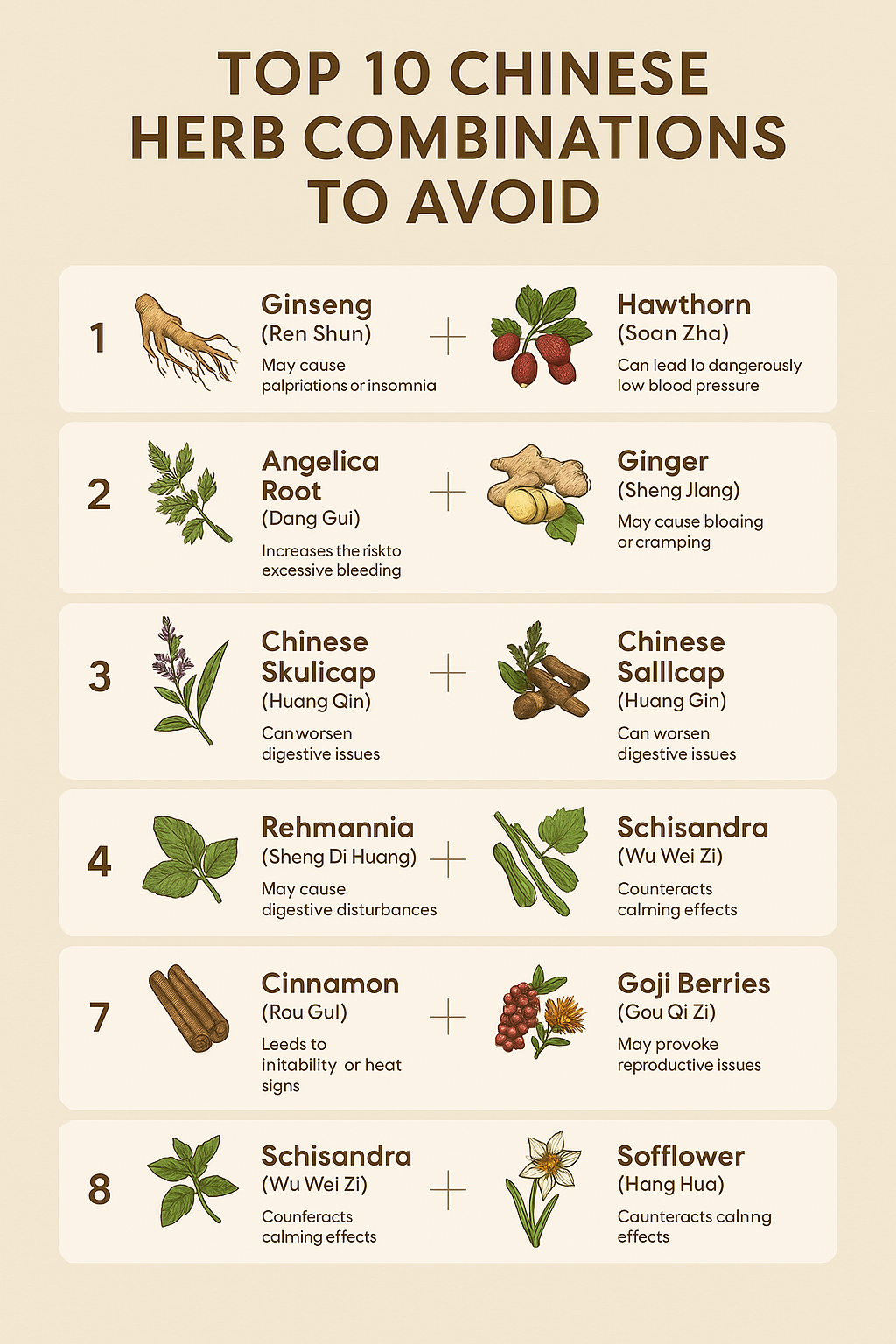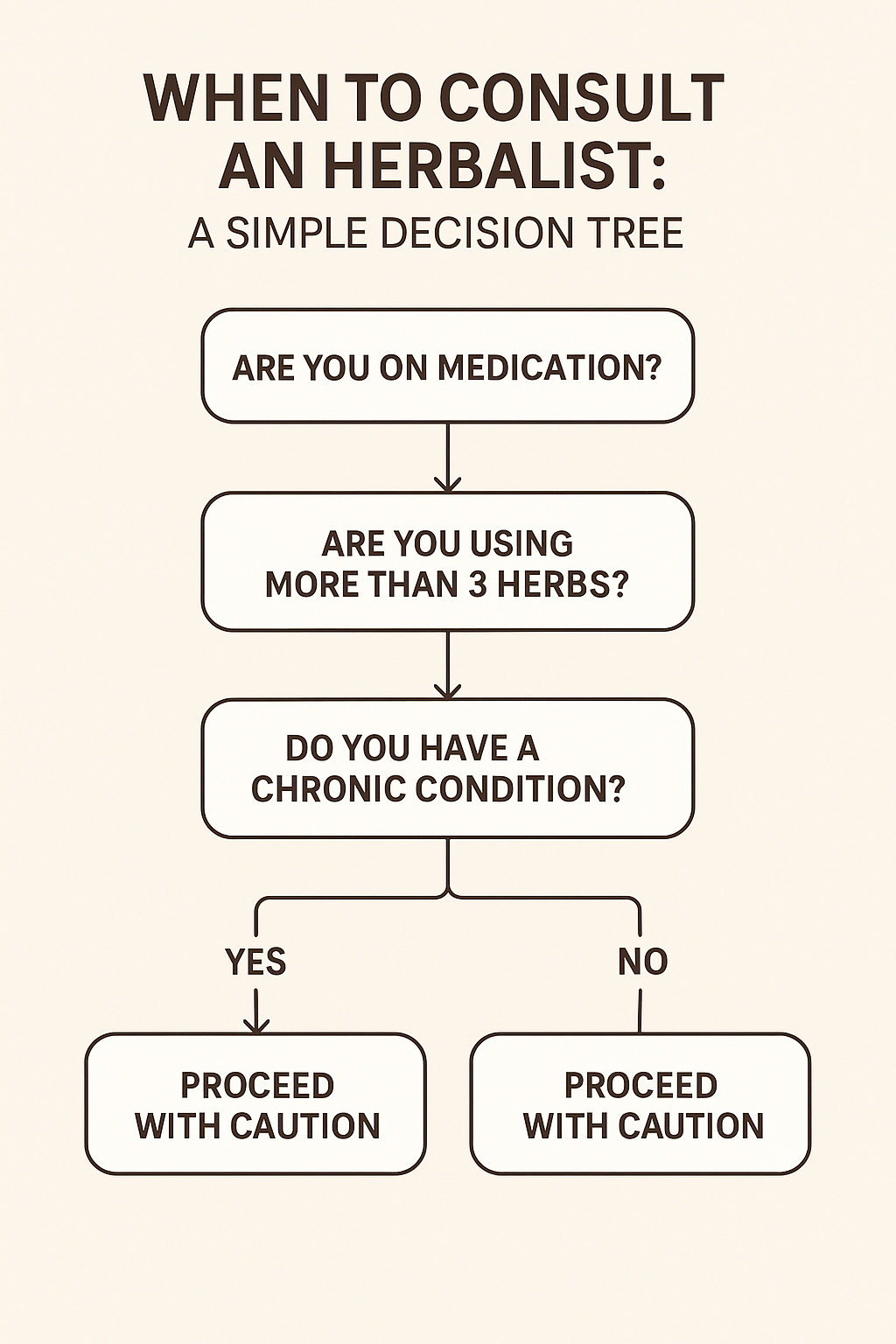Chinese Herb Combinations to Avoid: What You Must Know for Safe and Effective Use

Are You Unknowingly Combining the Wrong Chinese Herbs?
Unlock the ancient wisdom of traditional Chinese medicine with our comprehensive guide to Chinese herbs. For thousands of years, these natural remedies have been revered for their healing properties, offering support for a diverse range of health conditions. However, not all herbs are meant to be combined, and understanding the right pairs is crucial for achieving optimal health benefits. In this article, we’ll explore the top 10 Chinese herb combinations to avoid, their unique properties, and why certain pairs could lead to unwanted side effects. Whether you're a seasoned herbalist or new to the world of TCM, this guide will empower you with the knowledge needed to safely navigate the fascinating realm of Chinese herbs. Discover the right herbs for your health journey and learn how to harness their potential to enhance your well-being!
Why Herb Pairing Matters in Chinese Medicine
In TCM, herbs are rarely used alone. They are combined strategically to:
-
Balance opposing properties (hot vs. cold, moistening vs. drying)
-
Enhance or moderate effects
-
Target root causes and symptoms simultaneously
But when incompatible herbs are combined—especially without professional guidance—side effects or reduced effectiveness can result.
1. Ginseng (Ren Shen) and Licorice Root (Gan Cao)
- Properties:
- Ginseng: An adaptogen that enhances energy (Qi), boosts the immune system, and improves mental clarity.
- Licorice Root: Harmonizes other herbs, soothes the throat, and has anti-inflammatory effects.
- Reason to Avoid: Both herbs can excessively stimulate the body. Their combination may lead to overexcitement, manifesting as palpitations or insomnia.
2. Hawthorn (Shan Zha) and Licorice Root (Gan Cao)
- Properties:
- Hawthorn: Supports cardiovascular health and aids digestion by improving blood circulation.
- Licorice Root: As previously mentioned, it harmonizes other herbs and may incite blood pressure changes.
- Reason to Avoid: This pairing can heighten the effects of Licorice, causing dangerously low blood pressure, especially in those taking antihypertensive medications.
3. Angelica Root (Dang Gui) and Blood Thinners (like Warfarin)
- Properties:
- Angelica Root: Promotes circulation, nourishes the blood, and alleviates menstrual pain.
- Reason to Avoid: When combined with blood thinners, Angelica can enhance their effects, increasing the risk of excessive bleeding.
4. Ginger (Sheng Jiang) and Cold Herbs (like Peppermint)
- Properties:
- Ginger: Warming herb that enhances digestion, relieves nausea, and promotes circulation.
- Peppermint: Cooling herb that soothes digestive upset and reduces inflammation.
- Reason to Avoid: Combining these herbs can create conflicting thermal responses, leading to digestive discomfort such as bloating or cramping.
5. Chinese Skullcap (Huang Qin) and Licorice Root (Gan Cao)
- Properties:
- Chinese Skullcap: Known for its anti-inflammatory and calming effects, helpful in reducing anxiety and gastrointestinal issues.
- Reason to Avoid: This combination may weaken digestive function and exacerbate gastrointestinal issues due to their interacting properties.
6. Rehmannia (Sheng Di Huang) and Rhubarb (Da Huang)
- Properties:
- Rehmannia: Nourishes the blood and supports kidney function with cooling properties.
- Rhubarb: Strong purgative that clears heat and toxins but can cause loose stools.
- Reason to Avoid: Their opposing effects may create digestive disturbances when used together.
7. Cinnamon (Rou Gui) and Ginseng (Ren Shen)
- Properties:
- Cinnamon: Warming herb that promotes circulation and has anti-inflammatory properties.
- Reason to Avoid: Combining these herbs can lead to excessive Yang energy in the body, resulting in irritability and heat-related symptoms.
8. Schisandra (Wu Wei Zi) and Safflower (Hong Hua)
- Properties:
- Schisandra: Nourishes the liver, improves skin health, and helps combat stress.
- Safflower: Stimulates circulation and relieves pain but can be overly stimulating.
- Reason to Avoid: Safflower’s stimulation may counteract the calming and nourishing effects of Schisandra.
9. Goji Berries (Gou Qi Zi) and Black Cohosh (Sheng Ma)
- Properties:
- Goji Berries: Support eye health, boost the immune system, and provide antioxidant benefits.
- Black Cohosh: Commonly used for hormonal balance, it can influence estrogen-related symptoms.
- Reason to Avoid: This combination may disrupt hormonal balance and provoke unwanted side effects related to reproductive health.
10. Peppermint (Bo He) and Narcissus Bulb (Xuanfu Hua)
- Properties:
- Peppermint: Cooling herb that soothes digestive issues.
- Narcissus Bulb: Used for cough suppression and has strong expectorant properties.
- Reason to Avoid: Their excessive cooling effects can lead to gastrointestinal upset or nausea.

Safer Herbal Use: Best Practices to Follow
-
Work with a Licensed TCM Practitioner: Especially if you’re combining multiple herbs or taking medications.
-
Avoid Self-Diagnosing Complex Conditions: Some herbs can mask or aggravate underlying issues.
-
Pay Attention to Herb “Temperatures”: Warming and cooling herbs should be matched to your constitution.
-
Check for Pharmaceutical Interactions: Especially with blood pressure meds, antidepressants, and anticoagulants.
-
Start Low and Go Slow: Introduce new herbs one at a time and observe your body’s response.
Conclusion
The effectiveness of herbal combinations in traditional Chinese medicine relies on understanding the properties and interactions of each herb. Before using any combination of herbs, consult a qualified practitioner of traditional Chinese medicine to ensure safety and efficacy. With informed decisions, you can maximize the benefits of herbal treatments while minimizing potential risks.
FAQs
What are Chinese herbs?
Chinese herbs are natural plant-based substances used in traditional Chinese medicine (TCM) to promote health, balance, and healing. They can include roots, leaves, seeds, flowers, and bark and are used individually or in combinations to address various health conditions.
How are Chinese herbs used in medicine?
In TCM, Chinese herbs are often prescribed based on an individual's unique condition and constitution. They can be taken in various forms, including teas, tinctures, powders, or capsules, and are commonly combined to enhance their therapeutic effects.
What are the benefits of using Chinese herbs?
Chinese herbs can offer a wide range of benefits, such as improving digestion, boosting the immune system, relieving stress, promoting circulation, and addressing specific ailments like headaches, menstrual issues, and respiratory problems.
Are there any side effects of Chinese herbs?
While many Chinese herbs are considered safe, some may cause side effects, particularly if used improperly or combined incorrectly with other herbs or medications. Common side effects may include digestive upset or allergic reactions. It's essential to consult a qualified herbalist or healthcare provider.
What are the best Chinese herbs for health?
The best Chinese herbs can vary depending on individual health needs, but popular choices include Ginseng for energy, Licorice for harmonizing other herbs, Hawthorn for heart health, and Ginger for digestion. Always consult a professional to determine the right herbs for you.
How do I safely combine Chinese herbs?
To safely combine Chinese herbs, it's crucial to consult with a qualified practitioner of traditional Chinese medicine. They can provide guidance on compatible herb pairings and appropriate dosages to avoid potential interactions and ensure therapeutic efficacy.
What Chinese herbs should I avoid combining?
Certain herb combinations, like Ginseng and Licorice, or Hawthorn and Licorice, may have adverse effects when used together. These combinations can lead to overstimulation or exacerbate health conditions. Always seek professional guidance before combining herbs.
What are the best practices for using Chinese herbs?
Always consult a healthcare provider, start with small doses, and observe your body's reactions.
What should I look for when selecting herbs?
Choose high-quality herbs from reputable sources, and consider if they fit your specific health needs.
Choosing the right Chinese herbs involves understanding your specific health needs, preferences, and any pre-existing conditions. Consulting a qualified herbalist can help you find suitable herbs tailored to your body constitution and health goals.
Your Next Step In Using Chinese Herbs
Chinese herbs offer incredible healing potential, but their effectiveness depends on how wisely they’re used—especially when it comes to combining them. Understanding which herbal pairings to avoid helps protect your health and ensures you get the full benefits of Traditional Chinese Medicine. By staying informed and working with a knowledgeable practitioner, you can confidently explore the world of Chinese herbs with safety, clarity, and success. For trusted, high-quality herbs and personalized guidance, visit 1stChineseHerbs.com and take the next step in your wellness journey today.
Referenes
1. Angelica (Dang Gui) and Blood Thinners (e.g., Warfarin)
Angelica sinensis contains coumarins, which may potentiate the effects of anticoagulants like warfarin, increasing the risk of bleeding. Wikipedia
2. Ginger (Sheng Jiang) and Cold Herbs (e.g., Peppermint)
Ginger consumption has been shown to increase lower esophageal sphincter relaxation, which may lead to gastrointestinal discomfort such as bloating or cramping. PubMed
3. Chinese Skullcap (Huang Qin) and Licorice Root (Gan Cao)
Scutellaria baicalensis (Chinese Skullcap) combined with metformin has been studied for its effects on glucose tolerance and gut microbiota in type 2 diabetes patients. PubMed
4. Goji Berries (Gou Qi Zi) and Black Cohosh (Sheng Ma)
Black cohosh contains phytoestrogens, which can influence hormonal balance. Combining it with other herbs like goji berries may disrupt hormonal equilibrium.
5. Ginseng and Licorice Root
Ginseng may inhibit the analgesic effect of opioids, and when combined with other herbs like licorice root, it could lead to overstimulation. PubMed
Note: While some herb interactions are well-documented, others may lack extensive clinical studies. It's essential to consult with a qualified healthcare provider or a licensed Traditional Chinese Medicine practitioner before combining herbs or integrating them with conventional medications.

